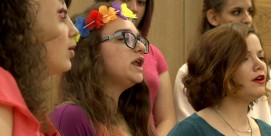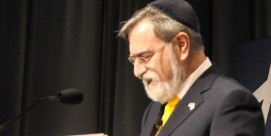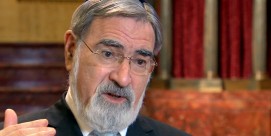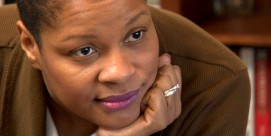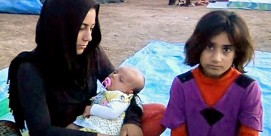War Relief Efforts
BOB ABERNETHY, anchor: In Jordan, next door to Iraq, humanitarian aid workers have relief supplies but only limited access to Iraq. Paul Miller reports from Amman on the aid situation and Arab opposition to the war.
PAUL MILLER: There are daily demonstrations in Amman — even in a freak spring snow — against the war in Iraq and the American government. Opposition to the war is overwhelming here among both Muslims and Christians.
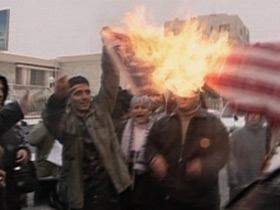
Father NABIL HADDAD (Melkite Greek Catholic Church): They are united by many things, and especially they are united these days by opposition to war — they don’t want to see war for many reasons.
MILLER: The opposition, including prayer vigils organized by local churches but open to all, goes hand in hand with a determination to provide humanitarian assistance to the Iraqis.
Dr. MOHAMMED AL-HADID (Director, Jordanian Red Crescent Society): Every Jordanian will be there to try to make a difference and will try to assist and make the impact of war on the humanitarian side less horrible.
MILLER: Jordan’s foreign minister, Marwan Muasher, said his country’s policy is to end the war quickly, preserve Iraq’s territorial integrity, and be a gateway for humanitarian aid from all over the world.
On Tuesday, the Red Crescent leaders of the Arab Emirates and Jordan jointly sent to Baghdad the first shipment of aid since the war started.
Aid goes by truck on the only highway from Amman to Baghdad. It used to move oil and other goods constantly, but now it’s mostly deserted because it’s too dangerous. The few drivers who will agree to make the trip charge $2,000 per run. The American military has warned them that the road is not safe.
STEVE WEAVER (Church World Service): The risk is being hit — being targeted by coalition forces.
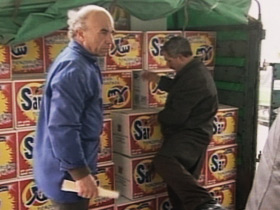
MILLER: Steve Weaver works for the All Our Children Project, which has loaded its first trucks with detergent and cleaning supplies for hospitals in Baghdad. The group’s goal is $1 million in aid for Iraq’s children — more than 60 percent of the population is under the age of 17. The project’s supporters include the National Council of Churches, the Mennonite Central Committee, and Lutheran World Relief. They are among the many private agencies which have been providing relief in Iraq and to the Palestinians.
There is a lot more aid in the pipeline, coming to Amman from the port of Aqaba or bought locally. The United Nations wants this to be a major aid conduit. But the trucking bottleneck could destroy relief plans, and conditions in Baghdad could soon worsen.
Mr. WEAVER: If the electricity goes, if the water goes, if those things go, then very quickly Baghdad will be a humanitarian crisis and if the trucks can’t get in, it could be very serious.
MILLER: Jordan is also trying to help refugees. It opened two camps near the border, expecting up to 100,000 Iraqis. Perhaps surprisingly, no Iraqis have turned up yet — just a few hundred foreigners fleeing Baghdad. Most have been sent on to their home countries. The camp is run by the Red Crescent, but half the volunteers are Christians, and meals are provided by Jordan’s evangelical churches.
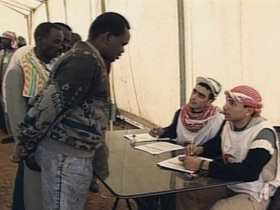
Mr. AL-HADID: It’s not only a Muslim society. We have been coexisting together, we have been living together peacefully, and we’ve never felt that “You are a Christian, I am a Muslim.”
MILLER: There are 170,000 Christians in Jordan — 5 percent of the population. The war has not driven a wedge between them and the Muslim majority, despite the efforts of some Muslim extremists.
GEORGE HAWATMEH (Chief Editor, AL-RA’I Newspaper): The fundamentalists, let’s admit it, they are looking for anything to exacerbate the situation between them and the Christians or between the Arabs and Muslims on the one hand and the West on the other. They use it for their own political ends and purposes. Some have been trying to do that, portraying this as a crusade and insisting upon it.
MILLER: But most here see the war in other terms — as an economic disaster. Jordan has lost its trade with Iraq and its tourists from the West.
Mr. HAWATMEH: The economy has slowed down, confidence in the economy, the stock market — all economic activity and even social activity has come to a halt quite literally.
MILLER: And Jordan, majority Palestinian, has long felt the effects of the Palestinian-Israeli conflict on its western border. The foreign minister says a second crisis to the east is almost too much to cope with. For many reasons, Jordanians pray for a quick end to war in Iraq. For RELIGION & ETHICS NEWSWEEKLY, I’m Paul Miller in Amman, Jordan.


